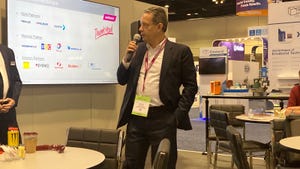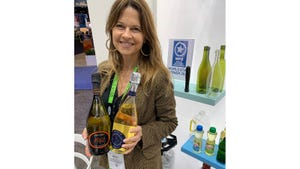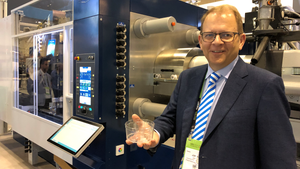June 1, 2004
|
Smart design and an acrylic compound improve filtering and fluid delivery in an intravenous set.
Seven years ago, Filtertek made headlines with its innovative “virtual enterprising†approach to new product development (see “Virtual Enterprising Spurs Growth,†May 1997 IMM). Today, the company still supplies its OEM customers in automotive, medical, and industrial markets with filtration systems and fluid control devices produced in a captive molding operation that boasts more than 200 presses and scores of patented products. Recently, the company introduced a new IV filter called MediPure, showcasing its ability to design products that address specific customer needs—a critical element of its success.
Challenging Environment
IV filters are an essential part of any intravenous set, keeping solids that precipitate out of solutions from reaching the patient. Used for medication delivery, parenteral feeding, and introducing saline into the body, IV sets need filters that also keep bacteria from entering a patient’s body.
Former versions, however, proved less than ideal from the perspective of both the IV set manufacturer (OEM) and the end user, typically nursing personnel. For the OEM’s part, filters required it to insert PVC tubing over the socket port to bond to the filter housing, adding time to the manufacturing process. In addition, materials used in the filter sometimes failed to resist alcohol and lipids, or to provide low levels of drug binding. On the other end, nurses struggled to prime the filters and release air trapped within.
Acrylic to the Rescue
To add alcohol and lipid resistance, Filtertek sourced Cyrolite CG-97, a medical-grade acrylic compound from Cyro Industries. The material provides the needed properties and maintains clarity.
Alcohol resistance is key to reliable performance, according to John Leahy, Filtertek’s medical program manager. “It is a prevalent chemical in the hospital environment, and the filters are often exposed to it,†he says. The material’s lipid resistance improves flow and delivery of internal feeding solutions that can adhere to filter housing walls and prevent the solution from being transferred.
In choosing a material for the new product, Leahy also considered drug binding. “OEMs are concerned about this issue, and we conducted a series of trials with a number of IV-administered drugs to document the degree of binding that could occur. The acrylic compound showed excellent resistance to drug binding in all cases.â€
Yet another feature of the material, its rigidity and strength, prevents rupturing that can occur when a peristaltic pump becomes occluded, building up pressure. “It’s important that a filter housing not flex under pressure from peristaltic pumps. That is why we stringently test materials and tolerances to ensure a strong housing and solid design,†says Leahy. “The MediPure filter housing has a uniform wall thickness that provides the integrity needed while also keeping the unit lightweight.â€
Filtertek plans to color-code the filter housing according to membrane filtration size to prevent accidental mismatches in the field. Clear MediPure filters will identify a .2-µm size, with blue for a 1.2-µm filter, and green for positively charged .2-µm filters.
Designed for Users and OEMs
Design played as critical a role as material selection in this success story. The filter housing is molded in two pieces—a bottom and a top component—that are bonded together once the filter membrane is inserted. The socket ports and tube ports are molded into the top component. Filtertek is the designer and manufacturer of the filter as well as codesigner of the automated manufacturing system used to produce it. The product runs in an automated manufacturing cell, specifically designed for and dedicated to this filter. (The company declined to provide details about its suppliers or the manufacturing cell because of its proprietary nature.)
Until the MediPure was introduced, IV filters needed to be inverted and tapped in order to expel air through the vent. When a solution bag is changed and a new bag is respiked, air can become trapped in the set. While filters prevent air from going downstream in an IV administration set, air trapped in the filter housing presents a challenge to nursing staff as they struggle to remove it. A new design for the MediPure filter makes this unnecessary, because it is vented to allow air to escape.
“The industry has a standard for what it considers primed,†says Leahy, “but we took it one step further. Nurses are extremely concerned when air is present in the line. We designed the MediPure housing with interior contours to facilitate the quick venting of all air in the line without effort.â€
OEM issues are addressed by another aspect of the filter’s design: the interchangeable port feature. Instead of inserting PVC tubing over the port to bond to the filter housing, Filtertek’s version enables set manufacturers to stick the tubing inside a port and still retain a solid bond. The socket port feature offers the same bond integrity as PVC tubing placed over a male end connection, and also allows greater flexibility for set manufacturers. Rather than use several different tubes and connections to adjust for different flow rates, manufacturers can adjust the inner diameter of the PVC tube itself while retaining the same connection.
“We developed the socket feature based on customer input. It provided an effective solution to cut turnaround on various IV set flow-rate adjustments and speed manufacturing time to market,†comments Leahy.
Contact Information Cyro Industries, Rockaway, NJ Filtertek, Hebron, IL |
You May Also Like





